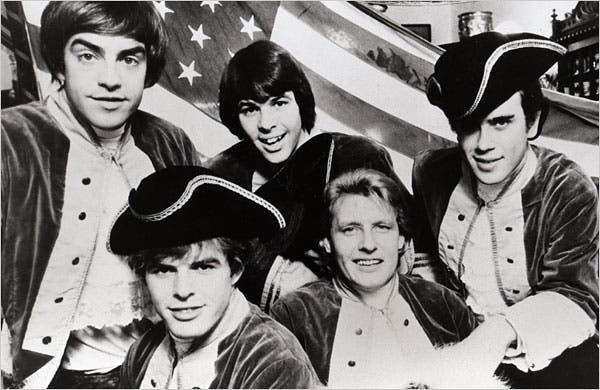If you are old enough to remember Paul Revere & the Raiders, you know Mark Lindsay, who was the lead vocalist, songwriter and producer of the band. Tall, dark features, a ponytail in back, he struck quite a figure in the mid 1960s. Lindsay turned 79 in March of this year. How is that possible.
Lindsay established a solo career while still with the Raiders in the early 1970s, finally leaving the group in 1975. The band was known for wearing Revolutionary War uniforms in the 1960s, which set them apart, but also saddled them with the legacy of a 1960s pop group. The other thing that hurt the group was the revolving lineup, as Lindsay and Paul Revere were the only holdovers by the end of the 1960s. The Raiders, as they were known in the 1970s, struggled to adapt to changing musical tastes and were dropped by Columbia Records where they sold a lot of records.

Lindsay would release several solo albums in the 1970s with mixed results. He wrote some of the songs on his albums while recording songs from other writers. Lindsay was part of group of male vocalists that could be classified as adult contemporary, or the dreaded MOR (middle of the road) artists. This meant AM radio instead of FM which embraced rock and more experimental sounds.
Lindsay fit in with Tom Jones, B.J. Thomas, Neil Diamond, Ray Stevens, Elvis, Anne Murray, The Carpenters, Olivia Newton-John, Tony Orlando and Dawn, Charlie Rich, Neil Sedaka, Mac Davis, Barry Manilow, David Cassidy, Johnny Mathis, Glen Campbell, Ronnie Milsap and others.
Adult contemporary is a long way from “Kicks”, “Hungry”, “Too Much Talk” and “I Had a Dream”. songs that kept company with the Beatles, Rolling Stones and The Who in the mid 1960s.
I wonder about the decision to remake him into a cross between Perry Como and Neil Diamond. Lindsay wrote many of the Raiders biggest rock and roll hits, and even took over producing the band. He put himself into the hands of writer/producers like Jerry Fuller who co-wrote the songs “Lies” by the Knickerbockers, “Travelin’ Man” by Rick Nelson, and “Young Girl” by Gary Puckett and the Union Gap. Fuller would produce “Arizona” and “Silver Bird” for Lindsay, brassy pop songs.

Lindsay did record some fine tracks, and had some chart success.
- First Hymn from Grand Terrace(Columbia) 1969, US BB 81, US AC 24 A Jimmy Webb song, good, but not great. Al Capps did the arrangements on the first Lindsay album. Better was “The Old Man at the Fair” not a single but a better Webb song that Lindsay recorded on the same day. https://youtu.be/ldlFy0-VpA8
- Arizona (Columbia) 1969, US BB 10, US AC 16, RIAA Gold – This was a very high charting song that I never thought was anything special. Successful, but not terribly interesting. Arrangement by Artie Butler. It has punchy horns and a wah-wah guitar mixed into the big production.
- Miss America (Columbia) 1970, US BB 44, US AC 20 – A story song reflective of what men thought of young women. It’s very dated now, but the music is superb, the quality of Burt Bacharach or Paul Williams. The string and horn arrangement work well on this song. https://youtu.be/eaQL8kM__yg
- Silver Bird (Columbia) 1970, US BB 25, US AC 7 A retread of “Arizona” basically, both written by Kenny Young.
- And the Grass Won’t Pay No Mind (Columbia) 1970, US BB 44, US AC 5 Written by Neil Diamond, a slower song but not very distinctive.
- Problem Child (Columbia) 1971, US BB 80, US AC 35 Written by Mac Davis, unfortunately the arrangement sounds like his other hits, buried under sludge in my opinion.
- Been Too Long on the Road (Columbia) 1971, US BB 98 A cover of the David Gates/Bread song. This version is quite good, about as rocking as Lindsay would get. I think this version is better than the Bread original. Arranged by Jerry D’Andrea. https://youtu.be/icNuepE-eMM
- Are You Old Enough (Columbia) 1971, US BB 87
- Something Big (Columbia) 1972, US AC 36 – The theme song to the film of the same name, written by Hal David and Burt Bacharach. Lindsay’s easy vocal style was perfect for this song. Too bad he didn’t cover more work by these songwriters. Unfortunately, the sophisticated Bacharach/David sound was ending as they would break up and radio was less inclined to delve into the bright 1960s pop sound. https://youtu.be/Iuub1eVpKfY
- Photograph (Columbia) 1975, US RW113 Too bad he did not use this arranging style for early singles.
- Sing Your Own Song (Greedy) 1976, US CB 103, US AC 22 His last charting single.
Lindsay did write a few of his singles. “Man From Houston” sounds like some of Elvis’ records. “Small Town Woman” was written by Fuller, who emphasized Lindsay’s soulful voice, giving it extra echo. It was released as a single but did not chart. Lindsay also wrote “So Hard to Leave You” another big horn and string arrangement, very MOR. “Bookends” was written by Lindsay’s producer and arrangers. It has a nice horn solo, it has a late 1960s Bacharach pop vibe. Good song. “All I Really See is You” is a bit folk, a bit gospel. The echo chamber gives him an Elvis sound. “Don’t You Know” is a thumping mid tempo rocker, written by Lindsay, why weren’t there more of these? “California” sounds like a Paul Williams song, it is not, but radio unfortunately ignored it.
“Indian Reservation (The Lament of the Cherokee Reservation Indian)” was released in 1971 and earned a gold record and topped the Billboard chart. Officially it was a Raiders song, but only Revere and Lindsay appeared on it. It was obviously a massive success, but it did not help the Raiders, who at this point was only Revere and Lindsay, nor did it boost Lindsay’s solo career much, because he was essentially a singles artist, rather than an album artist.
Toward the end of his Columbia career, his arrangements were less grand and a bit more grit returned, more reflective of current pop-rock songs. After Lindsay left Columbia in 1975, he continued to record on smaller labels and his production got less elaborate, no doubt having smaller budgets.
Lindsay’s voice has not failed him, even nearly 50 years later he consistently played casinos, fairs and clubs.
He released a CD in 2013, Life Out Loud, and a few of the listener reviews noted that he had wanted to produce a 1960s style of songs.







Leave a comment